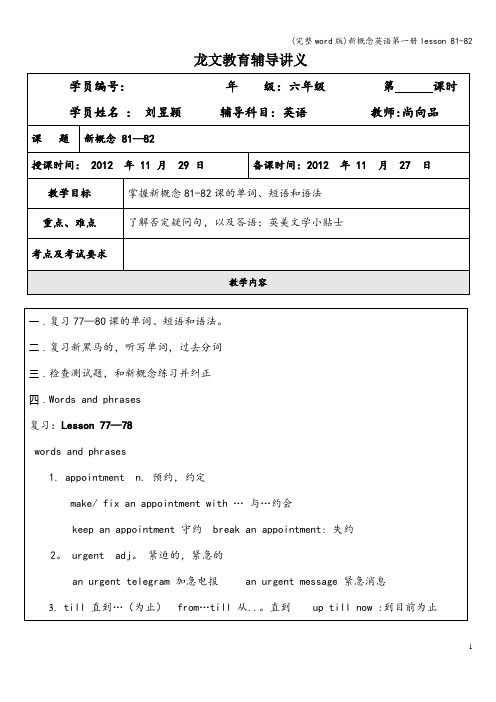新概念第一册81课文档
新概念英语第一册Lesson81-82-课件

What's wrong?
出了什么毛病。
(一般指物品,有时也指人哪里不舒服)
What happened to you?
你发生了什么事? (一般指人本身发生了的事)
What's up! 则是俚语、问对方怎么了,是一般的问好。
4.be going to do sth.表将来
(1)用于指人时,表示正打算做某事, 计划做某事
1. have a _m_e_a_l ___ 吃一顿饭 2. have a _h_o_lid_a_y__ 度假 3. have a _s_w_im____ 游泳 4. have a _r_e_st____ 休息 /have a break 5. have a _g_o_od__t_im_e高兴 /have fun 6. have a _c_ig_a_r_e_tt_e 抽一支烟 7. have a _b_a_th____ 洗澡 /have a shower 8. have __t_o____ 不得不
孩子们已准备好战斗。
★ dinner /’dInə/
n.正餐,晚饭
It’s time for dinner.
到时间吃晚饭了。 Enjoy your dinner. 请慢慢享用您的晚餐
常见词组: dinner party;宴会 give a dinner;设宴
3.What's the matter? 怎么了?
TOM: We had roast beef and potatoes.
be going to do something
(1)用于指人时,表示正 打算做某事,计划做某事
I am going to paint the bookcase pink.
新概念1第81课

Roast beef and potatoes 烤牛肉和土豆
Passage Explaination(课ppointed?
为什么卡罗尔感到失望?
New words and expressions(生词和短语)
bath
★ nearly
nearly adv. 几乎,将近
① adv. 几乎;差不多;差点儿
It is nearly half past six. 将近六点半。
I nearly missed the train. 我差点就错过了火车。
I'm nearly a pig.
我差不多是一只猪了。
② adv. 极;密切地
Tips: dinner(1)指正餐(可以是中餐,也可以是晚餐);(2)晚宴(主要是宴请某人或举办活动)。 supper 指晚饭,以及睡觉前吃的“夜宵”,睡前小食等。
课文重点句子讲解
1. I'm nearly ready.我正在制作购物清单
be ready 做好…的准备 nearly在此处修饰ready ,表示“快好了”
4)表示“有”的意思。 (此时它的疑问和否定形式有两种:用助动词引导 +由have本身引导,相当于have got) Look, I have wings, just like you. 看,我有翅膀,就像你一样。 He had fair hair and blue eyes. 他有金黄色的头发和蓝色的眼睛。
The matter concerns us nearly. 这事与我们有切身关系。
Tips:
nearly表示“接近”.常可与almost换用,但在否定意义(no,none,nobody,nothing,never )的结构中时,用almost。
新概念第一册课文81文本

课文81 烤牛肉和土豆622. Hi, Carol!Where's Tom?你好,卡罗尔!汤姆在哪儿?623. He's upstairs.他在楼上。
624. He's having a bath.他正在洗澡。
汤姆!625. Tom!Yes?什么事?626. Sam's here.萨姆来了。
627. I'm nearly ready.我马上就好。
628. Hello, Sam.你好,萨姆。
629. Have a cigarette.请抽烟。
630. No, thanks, Tom.不,谢谢,汤姆。
631. Have a glass of whisky then.那么,来杯威士忌吧。
632. OK. Thanks.好的,谢谢。
633. Is dinner ready, Carol?卡罗尔,饭好了吗?634. It's nearly ready.马上就好。
635. We can have dinner at seven o'clock.7点钟我们可以吃饭。
636. Sam and I had lunch together today.我和萨姆今天一起吃的午饭。
637. We went to a restaurant.我们去了一家饭店。
638. What did you have?你们吃了什么?639. We had roast beef and potatoes.我们吃的是烤牛肉和土豆。
640. Oh!噢!641. What's the matter, Carol?怎么了,卡罗尔?642. Well, you're going to have roast beef and potatoes again tonight!唉,今晚你们又要吃烤牛肉和土豆了!。
新概念一册81到90课原文及译文

Lesson 81 Roast beef and potatoes烤牛肉和土豆SAM: Hi, Carol!Where's Tom? 你好,卡罗尔!汤姆在哪儿?CAROL: He's upstairs. 他在楼上。
He's having a bath. 他正在洗澡。
汤姆!CAROL: Tom!TOM: Yes? 什么事?CAROL: Sam's here. 萨姆来了。
TOM: I'm nearly ready. 我马上就好。
TOM: Hello, Sam. 你好,萨姆。
Have a cigarette. 请抽烟。
SAM: No, thanks,Tom. 不,谢谢,汤姆。
TOM: Have a glass of whisky then. 那么,来杯威士忌吧。
SAM: OK. Thanks. 好的,谢谢。
TOM: Is dinner ready, Carol? 卡罗尔,饭好了吗?CAROL: It's nearly ready. 马上就好。
We can have dinner at seven o'clock. 7 点钟我们可以吃饭。
TOM: Sam and I had lunch together today.我和萨姆今天一起吃的午饭。
We went to a restaurant. 我们去了一家饭店。
CAROL: What did you have? 你们吃了什么?TOM: We had roast beef and potatoes. 我们吃的是烤牛肉和土豆。
CAROL: Oh! 噢!TOM: What's the matter, Carol? 怎么了,卡罗尔?CAROL: Well, you're going to have roast beef and potatoesagain tonight! 唉,今晚你们又要吃烤牛肉和土豆了!Lesson 83 Going on holiday 度假CAROL: Hello, Sam. Come in. 你好,萨姆。
新概念英语第一册第81课

新概念英语第一册第81课新概念英语第一册第 81 课主要是学习"have"这个动词的用法,以及与之相关的一些常见动词的用法。
其中包括:"have"表示"做"的用法,如"haveabath"、"haveacigarette"、"haveawalk"、"havearest"等;"do"表示"做"的用法,如"dothestairs"、"dotheLaundry"等。
同时,本课还学习了常用的短语动词,如"becoming"、"goto"、"haveaccessto"等。
课文主要语言点包括:"He"supstairs"表示他在楼上;"He"shavingabath"表示他在洗澡;"Yes?"表示疑问;"I"mnearlyready"表示我马上就好了;"Haveacigarette"表示抽支烟;"Haveaglassofwhiskythem"表示喝一口威士忌;"Isdinnerready,Carol?"表示晚饭准备好了吗,Carol?;"SamandIhadlunchtogethertoday"表示今天中午我和 Sam一起吃了饭;"Wewenttoarestaurant.restaurant,饭店。
注意该词的读音,因为源于法语,所以发音特别;"Wehadroastbeefandpotatoes"表示我们吃了烤牛肉和土豆;"What"sthematter,Carol?"表示发生了什么事,Carol?;"Well,we"regoingtohaveroastbeefandpotatoesagaintonig ht!"表示那么,我们今天晚上还要吃烤牛肉和土豆。
新概念英语第一册Lesson81-82

restaurant
n. 饭馆,餐馆 快餐店 fast food restaurant • 中餐厅 Chinese restaurant
西餐厅
Western restaurant
roast adj. 烤的 B.J. roast duck bake 北京烤鸭
grill n. 烤肉 toast n. 烤面包 barbecue n. 烧烤
New Concept English 1
Lesson 81-82
bath
n. 洗澡,泡澡 have a bath 汤姆正在洗澡。 Tom is having/ taking a bath.
同义:shower 淋浴;阵雨
take a shower have a shower
have a bath 洗澡 have a hot bath take a cold bath
课文讲解 Passage
此外,"potato"一词还可用于指人,生活中我们有 "couch potato"一语,指的是那些整日沉溺于电视的人, 他们坐在沙发上,吃着土豆条(片),眼睛一眨不眨地 盯着电视屏幕,所以此语用来指电视迷,多么形象的描 述! 在社交场合,美国人与别人交谈时,他们常说:"I'm a small potato.",含义是“我只是个小人物,没什么了 不起”,表达一个人的谦虚和涵养。但在公司里,如果 听到老板对员工说:"You are really potato-headed.", 这可就糟了,这是一句批评人的话,含义是“你真是个 傻瓜(笨蛋)。" 不仅如此,口语中美国人还将"potato"一词用于既可指 人也可指物的场合中,如"the clean potato"一语,指 的是最好的人(物);与之意思接近的一语是"quite the potato"(妙不可言的人,非常好的东西)。
新概念1 Lesson 81

请找出课文里面的现在进行时句子
He's having a bath. 他正在洗澡。
结构:主语+be(am,is,are)+V-ing
标志词:now,look,listen,at the moment
请找出课文里面的一般将来时句子
You're going to have roast beef and potatoes again. 你们又要吃烤牛肉和土豆了。
•
bath nearly ready dinner restaurant roast
洗澡 几乎 准备好的 晚餐 饭馆 烤的
have a bath
have的用法
洗澡
have a cigarette
抽烟
have a glass of whisky
喝一杯威士忌
ห้องสมุดไป่ตู้
have dinner/lunch
吃晚餐/中餐
他/她做了什么? What did he/she do?
他们做了什么? What did they do?
Exersice
Homework
1. 听写单词( ) 2.听读课文( ) 3.完成试卷( )
Carol:What did you have? We had roast beef and potatoes.
Carol:Oh! Tom: What's the matter,Carol? Carol:Well, you're going to have roast beef and potatoes again tonight!
Lesson 81 Roast beef and potatoes 烤牛肉和土豆
新概念英语第一册81-82课课件

背诵时刻 lesson79
出息了!敢不背书试试!人人网仅提供信息存储空间仅对用户上传内容的表现方式做保护处理对用户上传分享的文档内容本身不做任何修改或编辑并不能对任何下载内容负责
新概念英语第一册81-82 课课件
Lesson 81 Roast beef and potatoes
SAM: Hi, Carol! Where's Tom? CAROL: He's upstairs在楼上. He's having a bath.=take a shower洗澡
I’m gn have a haircut have a cup of tea have a party
in the morning at noon in the afternoon in the evening
I’m going to _______.
TOM: Sam and I had lunch together today. We went to a restaurant. CAROL: What did you have? TOM: We had(翻译为“吃”) roast beef and potatoes.
be going to=?
It's nearly ready. I'm nearly ready.
CAROL: Oh! TOM: What's the matter (with you), Carol?
=what's up 怎么了?发生什么事了? CAROL: Well, you're going to have roast beef and potatoes again tonight!
be going to 计划做 某事
新概念英语第一册Lesson81-82

restaurant
• n. 饭馆,餐馆 • 快餐店 fast food restaurant • 中餐厅 Chinese restaurant • 西餐厅 Western restaurant
roast adj. 烤的
• grill n. 烤肉 • toast n. 烤面包 • barbecue n. 烧烤
一个五成熟的牛肉和 一个八成熟的牛肉走在路上 为什么不讲话? 因为不熟 牛少了一个角会怎么样? 变成犀牛
课文讲解 Passage
美国人很喜欢吃土豆,而且还有多种吃法, 其中比较受美国人欢迎的吃法是炸薯条 (fried potato)和炸薯片(potato crisp), 这在美国各地城市大街上比比皆是的快餐 店中,如麦当劳(McDonald's),肯德基 (Kentucky)里等可以说是一种老少皆宜的 休闲食品。 美国人还将整个土豆烤着吃(baked potato),对于刚刚烤出的热气腾腾的土豆 (hot potato),拿起来烫手,使人很想立 即将其扔掉,于是源自于日常生活的这一 妙语——"hot potato"便引申用于指那些 棘手的问题或难以处理的局面。
同义词:almost adv. 几乎,差不多
现在将近午夜了。 It is almost midnight.
ready
• adj. 准备就绪的 • be ready to do sth. • 我快准备好了。 I am nearly ready. • adj. 预先准备好的 • 我们必须把房子收拾妥当 为客人的到来做好准备。 • We must get our house ready for the house. get ready for sth.
Warm-up
(完整word版)新概念英语第一册lesson 81-82

表示惊异、反问、责难等语气时通常用否定疑问句,且通常意为“难道…不…”
【结构】⊙↖↗⊙ 在正式文体中,用句型“be/助动词/情态动词+主语+ not + 其他"实际上结构是在一般疑问句的主语后面加not(不与任何词缩写)构成,例如:
Did you not know? 难道你不知道吗?
3.You are going to have roast beef and potatoes again tonight.
Be going to 是一般将来时的基本结构之一
【重点】一、be going to 的用法点拨 :be going to 是一种固定结构,它后面要接动词原形。含有be going to 结构的句子中往往有表示将来的时间状语,如:tomorrow, next week等。
3。 breakfast 早餐 at breakfast 早餐时; 正在进行早餐have( take) breakfast 用早餐
4.party 聚会,政党 join the party 入党
5。 holiday 假期,假日on holiday:在休假中; take a holiday 休假
Sentences:
be going to 结构中的助动词be很少用原形,be随主语人称和数的变化而变化,它一般有三种形式,am , is , are 。而going to 固定不变.即:当主语是 I 时用am ;当主语是第三人称单数时用is;当主语是其他人称时用are。
I am going to buy something tomorrow morning.明天早上我要去买些东西。
Sentences
1.I'm making a shopping list
新概念英语第一册课文81-91

新概念英语第一册课文81-91新概念英语第一册学习资料免费下载:vickey新概念英语新概念英语第一册视频免费下载:vickey新概念英语视频Lesson81 Roast beef and potato.John: Hullo, Peggy! Where’s Tom?Peggy: He’s upstairs. He’s having a bath.Peggy: Tom!Tom: Yes?Peggy: John’s here.Tom: I’m nearly ready.Tom: Hullo, John. Have a cigarette.John: No thanks, Tom.Tom: Have a glass of whisky then.John: O.K. Thanks.Tom: Is dinner ready, Peggy?Peggy: It’s nearly ready. We can have dinner at seven o’clock. Tom: John and I had lunch together today. We went to a restaurant.Peggy: What did you have?Tom: We had roast beef and potatoes.Peggy: Oh!Tom: What’s the matter, Peggy?Peggy: Well, you’re going to have roast beef and potatoes again tonight!Lesson 81 Roast beef and potatoes 烤牛肉和土豆萨姆:你好,卡罗尔!汤姆在哪儿?卡罗尔:他在楼上。
他正在洗澡。
卡罗尔:汤姆!汤姆:什么事?卡罗尔:萨姆来了。
汤姆:我马上就好。
汤姆:你好,萨姆。
请抽烟。
萨姆:不,谢谢,汤姆。
汤姆:那么,来杯威士忌吧。
新概念一册_81-86(完美版)

Lesson 81 Roast beef and potatoes1 Introduce the storyT: Today we'll listen to a story about Carol who is making dinner for her husband and his friend.2 Understand the situationAsk the students to interpret the pictures.3 Listening objectiveT: Listen to the story and see if you can answer this question: Why is Carol disappointed?一.words and expressions1. bath:n. 洗澡take a bath/ have a bath (在浴缸里洗澡)take a shower/ have a shower (淋浴)eg:I shall have a hot bath and go to bed.He takes a cold bath every morning.补:bath tube 浴缸,bathrobe浴衣,bathroom 洗手间我要上厕所:(可以说成)I need to go to the bathroom.bathe; v 洗澡2. nearly:adv. 几乎,将近与almost的意思基本相同eg:It’s nearly one o’clock. I nearly finished.3. ready: adj. 准备好的be/ get ready for…做好…的准备(状态/ 动作)eg:Everything is ready for the party. 聚会的一切事情都已准备好. You must get ready for the race.be ready to do 已准备好做…; 愿意做…; 眼看就要…eg: I am ready to go. / She is always ready to help others.(愿意做) The child is ready to burst into tears.4. dinner:1) 餐,正餐(三餐的主要一餐)(该进晚餐了)It’s time for dinner.Dinner is ready. 2) (正式的) 宴会,晚会dinner party 宴会,be at dinner 用餐中have breakfast 吃早餐,have lunch 吃午餐,have supper,have dinner 5. restaurant:n. 饭馆,餐馆café:n. 小餐馆(在英国通常不供应酒类)cafeteria:自助食堂inn:小酒馆6. roast:1)adj. 烤过的 a roast chicken 烤鸡Beijing Roast Duck:北京烤鸭2)v. 烤、烧eg:I roasted a chicken.3) n. 烤肉I want some roast.补:grill:v. (用烤架)烧烤grill room 烤肉馆bake:v 烤(面包,饼,通常指在炉中烤)The bread is baking。
新概念1册第81课

Carol and Tom tonight? ❖Is dinner ready?
❖When is dinner going to be ready? ❖What did Sam and Tom do today? ❖What did they have for lunch? ❖Is Carol disappointed? ❖What are they going to have for
It's nearly ready. I'm nearly ready.
CAROL: It's nearly ready.
We can have dinner at seven o'clock.
TOM: Sam and I had lunch together today.
We went to a restaurant.
Review
Homework
❖ 课次:第4次
时间:1月16日
❖ 上课内容:Lesson 79-82
❖ 作业要求:1. 抄写79-82课所有单词,并于家中听 写签字。
❖
2. 听并跟读磁带30分钟,背诵Lesson 79和
81.
❖
3. 完成练习册79-82课的内容。
❖
4. 课前Report还剩10次机会,只要你想锻炼,
➢ She’s nearly twenty. ➢ It’s nearly 2 o’clock. ➢ nearly empty / full / finished
1. 1. be too ready with excuses 很会 找借口
- 1、下载文档前请自行甄别文档内容的完整性,平台不提供额外的编辑、内容补充、找答案等附加服务。
- 2、"仅部分预览"的文档,不可在线预览部分如存在完整性等问题,可反馈申请退款(可完整预览的文档不适用该条件!)。
- 3、如文档侵犯您的权益,请联系客服反馈,我们会尽快为您处理(人工客服工作时间:9:00-18:30)。
Lesson 81Roast beef and potatoes烤牛肉和土豆一、New Word and expressions 生词和短语1、bath [bɑ:θ]n. 洗澡pl.baths[bɑ:ðz] shower ['ʃauə]n.淋浴bathtub/tub[tʌb]n.浴缸,浴盆have a bath/take a bath洗澡v.给...洗澡bath+N.(同bathe)It’s your turn to bath the baby.轮到你给婴儿洗澡了。
bathe[beið]v. 沐浴;用水洗n. 洗澡;v.用水清洗(尤指身体部位)bathe+N.Please bathe the wound first.请先清理伤口。
sunbath(e)n.日光浴2、nearly ['niəli]adv. 几乎,将近near[niə]adj.近的almost['ɔ:lməust]adv. 差不多,几乎nearly与almost差别细微,大多数情况下可通用。
It’s almost [nearly] impossible. 那几乎是不可能的。
It was nearly [almost] five thirty. 几乎已经五点半了。
区别:(1)almost 可用于 any 以及 no, none, nobody, nothing, never 等否定词之前,但 nearly 一般不这样用。
Almost nobody knows where he comes from.几乎没有人知道他是从哪来的。
(2)nearly 前可用 very, pretty, not 等词修饰,但 almost 之前不能用这些词。
not nearly 远非,绝不是Your answer is not nearly right.你的答案离正确的差的远呢。
It’s not nearly as easy as you think.这远不像你想得那么容易。
3、ready ['redi]adj. 准备好的,完好的(1)准备好,准备完毕ready(for sth.)/ready(to do sth.)Are you ready for the exam?I’m ready to take the exam.你准备好参加考试了吗?(2)已完成,准备好,可以用ready(for sth.)/ready(to do sth.)Come on ,dinner is ready.快过来,晚饭好了。
get ready for sth./to do sth..为某事做好准备(强调动作)be ready for sth./to do sth.为某事做好准备了(强调状态)(3)方便使用的,现成的The dictionary is ready to hand.字典就在手边。
a ready meal.买的现成的饭菜4、dinner ['dinə]n. 正餐,晚餐supper晚餐,通常指少量或非正式的,或者是睡前的夜宵breakfast['brekfəst] n. 早饭lunch[lʌntʃ]n. 午餐brunch[brʌntʃ]n. 早午餐meal[mi:l]n.一餐tea[ti:] n.下午茶点,三明治,糕点等和一杯茶若午餐为dinner,晚餐大多用tea或supper,若午餐为lunch,晚餐则大多较dinner.5、roast [rəust] adj. 烤的 n.烤肉roast king百富烤霸各种肉,meat肉,beef牛肉,lamb羊羔肉,steak牛排,mince肉馅,chicken鸡(Lesson 49) barbecue['bɑ:bikju:] n.烧烤野餐bake[beik]vt. (在烤炉里)烤,烘焙 baker面包师 the baker’s =bakery=bake shop面包店(Lesson 67)toast['təust]vi. 烘,烤(尤指面包);为...举杯敬酒,干杯6、restaurant['restərɔnt] n. 饭馆,餐馆7、haircut ['hεəkʌt] n. 理发hairdresser['hεə,dresə]n.理发师the hairdresser’s 理发店barber['bɑ:bə] n.理发师barbershop理发店8、party['pɑ:ti] n. 聚会政党,党派join the party入党做参加意义时的区别,前者表示参加组织并成为其中一员,后者表示参加活动中国共产党 Chinese Communist Partybanquet ['bæŋkwit] n.宴会,盛宴ball n.大型正式的舞会9、holiday['hɔlədi] n. 假日vacation[və'keiʃən]n.假期两者区别甚小on holiday/vacation在度假take a holiday休假make holiday 度假the school holidays学校假期the summer holidays暑假the Christmas holidays圣诞节假期 a holiday resort度假胜地Where are you going for your holidays?你要到哪里休假?二、课文讲解SAM: Hi, Carol!Where's Tom?CAROL: He's upstairs.He's having a bath.CAROL: Tom!TOM: Yes?CAROL: Sam's here.TOM: I'm nearly ready.TOM: Hello, Sam.Have a cigarette.SAM: No, thanks, Tom.TOM: Have a glass ofwhisky then.SAM: OK. Thanks.TOM: Is dinner ready, Carol?CAROL: It's nearly ready.We can have dinner at seven o'clock.TOM: Sam and I had lunch together today. We went to a restaurant.CAROL: What did you have?TOM: We had roast beef and potatoes.CAROL: Oh!TOM: What's the matter, Carol?CAROL: Well, you're going to have roast beef and potatoes again tonight!讲解1、Where's Tom?where引导的特殊疑问句,用来询问地点或位置。
由where引导的,含有系动词be的特殊疑问句的结构与以前学过的特殊疑问句的结构一样:“where + be +主语“。
Where is Amy?Amy在哪?Where are your books?你的书在哪?在英语中最主要的是升调和降调。
陈述句以wh-开头的特殊问句用降调,即在句子的最后一个重读音节语调下降。
Where does he come from?他是从哪里来的?Where are you going for your holidays?你要到哪里休假?需要用yes或no回答的一般问句用升调,即在最后一个重读音节语调上升。
Is this your pencil?这是你的铅笔吗?Would you go with me?你会和我一同去吗?2、upstairs adv. 在楼上,向楼上downstairs adv. 在楼下Come upstairs and see it.到楼上来看看吧。
(and 表目的,不做“和”讲,此句不能用Come upstairs to see it.Lesson 13.)I carried my books upstairs.我把书搬到楼上去了。
An upstairs neighbour has lost his wallet,too.楼上一个邻居也丢了钱包。
(upstairs 做形容词时只能放在名词前。
)The children rushed downstairs.孩子们冲下楼梯。
3、He's having a bath.现在进行时,表示此时此刻或现阶段正在进行的动作。
have sth.做某事,have a bath洗澡/have a drink喝酒/have breakfast/lunch/supper/dinner/ameal吃早饭/午饭/晚饭/晚饭/一顿饭/have a holiday 度假/have a swim 游泳/have a rest 休息/have fun 有趣/have a cigarette 抽一支烟在翻译时的做根据意思相应的翻译。
Have表示“有”时的疑问句型:have在句首,have...got,do...haveHave you got a meeting today?你今天有会吗?(英国英语)Have you an apointment?你有约吗?Do you have a meeting today?你今天有会吗?(美国英语)4、Sam's here.here跟there 表示给某人东西或支出某物时,倒装句的规则,主语是名词时全部倒装,主语是人称代词时部分倒装(Lesson 2)My ticket is here.=Here is my ticket.这是我的票。
Here comes the bus.公交汽车来了。
A:Here are your keys.这是你的钥匙 B:Oh,here they are!啊,在这里啊。
5、Have a cigarette.祈使句用来表示请求、劝告、建议、叮嘱、号召、命令等,它的主语you(听话人)通常可以省略,谓语动词用原形,句子末尾用感叹号或句号。
本句中表示建议,也可说成:Would you like a cigarette?5、a glass of whisky thenglass n. 玻璃;玻璃制品;镜子glasses n.眼镜,双筒望远镜。
a glass of一杯a cup of一杯 a bottle of 一瓶各种酒:烈酒分为六大类:whisky威士忌Brandy白兰地(轩尼诗Hennessy 人头马Remy Martin)Rum朗姆Gin金酒,琴酒,杜松子酒Vodka伏特加Tequila特吉拉酒,龙舌兰酒champagne香槟white spirit白酒6、potatoes以字母o, ch, sh, ss 或x结尾的单词,在词尾加es构成其复数,但以字母o结尾的外来词或缩写词的复数形式是只加S。
